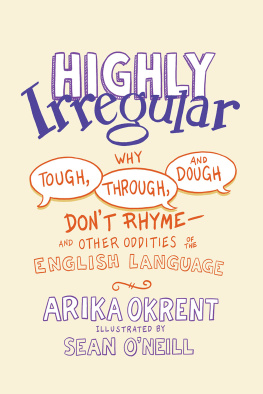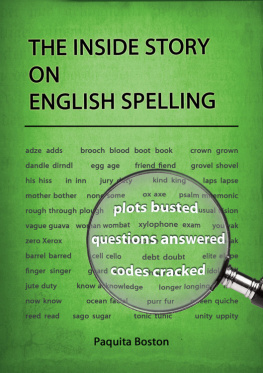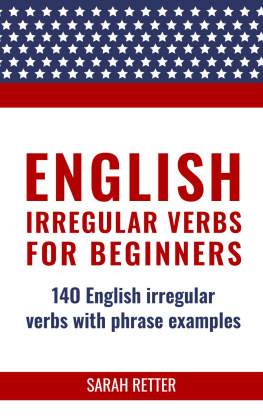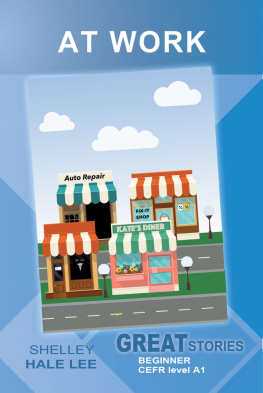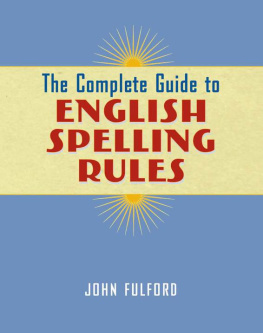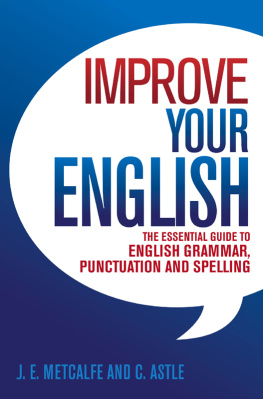Highly Irregular

Oxford University Press is a department of the University of Oxford. It furthers the Universitys objective of excellence in research, scholarship, and education by publishing worldwide. Oxford is a registered trade mark of Oxford University Press in the UK and certain other countries.
Published in the United States of America by Oxford University Press
198 Madison Avenue, New York, NY 10016, United States of America.
Arika Okrent 2021
All rights reserved. No part of this publication may be reproduced, stored in a retrieval system, or transmitted, in any form or by any means, without the prior permission in writing of Oxford University Press, or as expressly permitted by law, by license, or under terms agreed with the appropriate reproduction rights organization. Inquiries concerning reproduction outside the scope of the above should be sent to the Rights Department, Oxford University Press, at the address above.
You must not circulate this work in any other form and you must impose this same condition on any acquirer.
Library of Congress Cataloging-in-Publication Data
Names: Okrent, Arika, author.
Title: Highly irregular : why tough, through, and dough dont rhymeand
other oddities of the English language / Arika Okrent ; Illustrations by Sean ONeill.
Description: New York : Oxford University Press, 2021. |
Includes bibliographical references and index.
Identifiers: LCCN 2021004585 (print) | LCCN 2021004586 (ebook) |
ISBN 9780197539408 (hardback) | ISBN 9780197539422 (epub)
Subjects: LCSH: English languageOrthography and spellingHistory. |
English languagePronunciation.
Classification: LCC PE1141 .O35 2021 (print) | LCC PE1141 (ebook) |
DDC 421/.52dc23
LC record available at https://lccn.loc.gov/2021004585
LC ebook record available at https://lccn.loc.gov/2021004586
DOI: 10.1093/oso/9780197539408.001.0001
Table of Contents
Dearest creature in creation
Studying English pronunciation,
I will teach you in my verse
Sounds like corpse, corps, horse and worse.
I will keep you, Susy, busy,
Make your head with heat grow dizzy;
Tear in eye, your dress youll tear;
Queer, fair seer, hear my prayer.
Pray, console your loving poet,
Make my coat look new, dear, sew it!
Just compare heart, hear and heard,
Dies and diet, lord and word.
So begins the poem The Chaos, which the Simplified Spelling Society called an indictment of the chaos of English spelling, or, more flamboyantly, a compendium of cacography. It was printed in the societys summer newsletter in 1986 and went on for 246 lines. It came with a specific request: Can any reader name the author or supply any further details about the poem?
Before landing with the editor of the newsletter, the poem had passed through many hands. It was rumored to have been discovered in a girls high school in Germany at the end of World War II. Retyped and mimeographed copies of slightly different versions had made their way around Europe. There were stories from students of English in various countries who recalled their professors using it in class to broach, in a lighthearted way, the frustrating challenge of figuring out how to match sound and spelling in the language.
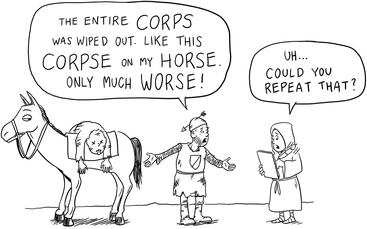
The origin of the poem was eventually tracked down, and in 1994 the Simplified Spelling Society issued an update. The author was a Dutch writer named Gerard Nolst Trenit. The poem was first published in 1920 in an appendix to the fourth edition of his book Drop Your Foreign Accent: engelsche uitspraakoefeningen. The Dutch subtitle translates to a guide to English pronunciation, but Nolst Trenit clarified that it was not a guide but an exercise book... less like a drill-master, who teaches you how to perform your feats, than like a set of gymnastic apparatus on which you have to perform them yourselfvocal gymnastics.
The main apparatus was verse, in which rhythm and rhyme may act as fly-wheels, strengthening and equalizing the movement of the vocal organs. The poems he supplied were easy to commit to memory, and, he suggested, Having chosen those which contain your special stumbling-blocks, you may conveniently practice them during a lonely walk, sitting all by yourself in a railway carriage, etc.
He should know. After all, he had had to do the work to learn to produce it himself. Born in Utrecht in 1870, he learned English (among other languages) the hard way, at school. After university, he spent two years in San Francisco, where he worked as a tutor for the children of a Dutch family. But otherwise, aside from a short stint teaching English and French in the Dutch East Indies, he spent the rest of his life in the Netherlands, in Haarlem, at the same address.
Most of Nolst Trenits career was spent not in explaining the challenging intricacies of English but in nitpicking defense of his own native language. For more than thirty years he had a column in the Groene Amsterdammer where, writing under the name Charivarius, he scolded, berated, teased, and criticized his fellow countrymen for their sloppy and annoying language habits.
Charivarius had a long list of favorite annoyances: too much capitalization in titles; the overuse of the word nauwelijks (hardly); Germanisms, such as the use of slagroom for whipped cream instead of the pure Dutch geklopte room. He railed against pleonasms like fierce fire (fire is already fierce!) and useless waste (waste is already understood to be useless!) and came up with his own labels for his favorite peeves. Fnaffers and fnuiters were those who used vanaf and vanuit (from off, from out) for what he decreed should be simply van (from).
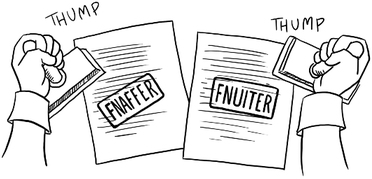
Many of these errors are fully accepted in Dutch now, and some of them may have only ever bothered Charivarius to begin with.
Drop Your Foreign Accent went through seven editions during Nolst Trenits lifetime (and four more after his 1946 death). The Chaos nearly doubled in length over that time, as Nolst Trenit thought of more and more English spelling inconsistencies to add to it. As the poem grew, so did the force of its comic absurdity. In one book of his collected verses, he introduced it with the line May it spread fear and dismay.
The final lines of the poem itself read:
Finally: which rhymes with enough,
Though, through, plough, cough, hough, or tough?
Hiccough has the sound of sup...
My advice isgive it up!
But of course he didnt really want the reader to give up on English. He ends the introduction to Drop Your Foreign Accent with a notification that the appendix includes a small collection of phonetical paradoxes in verse form and that the last line contains an advice; my advice isdont take it.
Nolst Trenit saw that the Dutch language had its own inconsistencies too. One poem called Taal-Rijm (Language rhyme) was dedicated to the foreigner who learns Dutch. He points out, for example, that while the plural of

